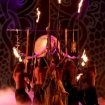Score composer Bear McCreary is well-known within the industry for his adaptability. Over the past 20 years he's worked on music for everything from The Walking Dead to the Metalocalypse rock opera Doomstar Requiem, but the new God of War game would be a daunting challenge no matter what's on your resume. Sony's Santa Monica Studios has been working on the franchise reboot since at least 2014, in which time the cultural definition around video games — especially blockbuster, triple-A video games — completely shifted. When we first caught a glimpse of the reborn Kratos at E3 2016, he was envisioned as a surly, melancholy father in the mystical northern wilds with a teenaged son at his side. This was not the Ares-murdering Ghost of Sparta we were used to; there would be no Blades of Chaos whipping around his head like a tilt-a-whirl, or an indulgent sex mini-game shoved in the middle of the narrative. No, this was different, and McCreary approached it as such.
"In many ways, not only did I set aside my memories of the old God of War games, I treated it like it was a whole new thing," he says. "We wanted to craft something new that pushed the boundaries as far from the old games as possible. It was an experiment, and at first we went too far. The first sketches I came up with were very small — a couple strings, a couple solos — it had a very sad theme. A tiny, raw folk ensemble. Everyone liked it, but we were like, 'Now we found the edge, let's take it back to the middle and put some orchestra back in.'"
In its heyday, God of War consistently produced some of the most memorable music in all of games, but even then, it tended to be a little one-note. Kratos tore through the flesh of the Greek pantheon, while a choir of Latin valkyries chanted bloody murder over white-hot strings and chest-shattering drums — perfect for a video game that is, in both theme and aesthetics, predominantly about violence. While McCreary was a fan of the series, he understood how that could be a little limiting. "I love the old God of War games, but I would not describe them as emotionally dynamic," laughs McCreary. "It's cool, it's loud, but it's kind of like when you go to a heavy-metal concert and your ears are ringing, but after five minutes, it doesn't feel loud anymore. You just reach this peak and you've adjusted."
Instead, McCreary focused on writing a huge, insanely varied score, full of peaks and valleys, tiny incantations and gigantic set pieces. If you love the work Gerald Marino did on the PS2 games, don't worry, McCreary promises there are still moments where he gets the lead out, but generally this score is more grown-up, with a more holistic point of view. You can chalk that up to the groundbreaking way God of War presents its story — in a single, over-the-shoulder camera shot behind Kratos' back — like Birdman with brutal axe kills. It's an audacious premise, and one that offered a slew of unique challenges to the orchestra. "You need the emotional closure that the story desires, but it doesn't cut!" says McCreary. "I had to be mindful about how the camera would settle back on Kratos. ... To be honest with you, when [Game Director] Cory Barlog told me that this game would be shot that way, I was like, 'Yeah, no way.' I was thrilled that it was actually implemented."
You can also always count on Bear McCreary to do his homework. One of the tent-pole draws of the new God of War game is the change of setting. Kratos has ventured to the Nordic lands, to throw hands with the icons of Norse mythology. (It makes sense, when you consider that the vast majority of the Mount Olympus deities laid dead at his feet at the end of God of War III.) McCreary didn't want to take any shortcuts, so he spent months researching and listening to the folk music of Viking antiquity. As a composer, he wanted to make the melodies, harmonies and instruments of that region part of his second nature — something he could draw on without it coming off hackneyed or forced.
"I wanted it to feel authentic. I brought in a hardanger fiddle, I brought in a nyckelharpa, I brought in other European folk instruments, to invoke that region. That was a vital starting point, an entryway into the character," says McCreary. "I was looking for sad, lyrical laments, but I always found a hopefulness in the way [the Nords] used certain chords. … A lot of European folk music has this interesting, intriguing quality, a whole new harmonic way of thinking. That's why the score sounds more folk-influenced than anything I've ever done."
It's funny that God of War is finally in people's hands, and Bear McCreary is moving on to his next job. That is the life of a contract musician, of course, but it's always been a difficult thing to imagine. How do you spend years on a massive, era-defining game, only to detach yourself immediately and decamp in a brand new artistic sphere? "I feel like I've been sitting on a surprise party for years," he laughs, when he thinks about the journey he's taken with Santa Monica Studios. Then again, McCreary is not like most of us, and frankly, he couldn't imagine working any other way.
"I find it rejuvenating. When I feel like my creative gas is running low, one of the things I can do to refill it is to go flex other muscles. The ability to jump between the lyrical Celtic Outlander score, and then go do a grizzly death scene in The Walking Dead is pretty cool," he concludes. "I thrive on multitasking. I'm constantly juggling different projects. If they were all the same thing, it'd be really hard. ... It's the perfect configuration of events."











